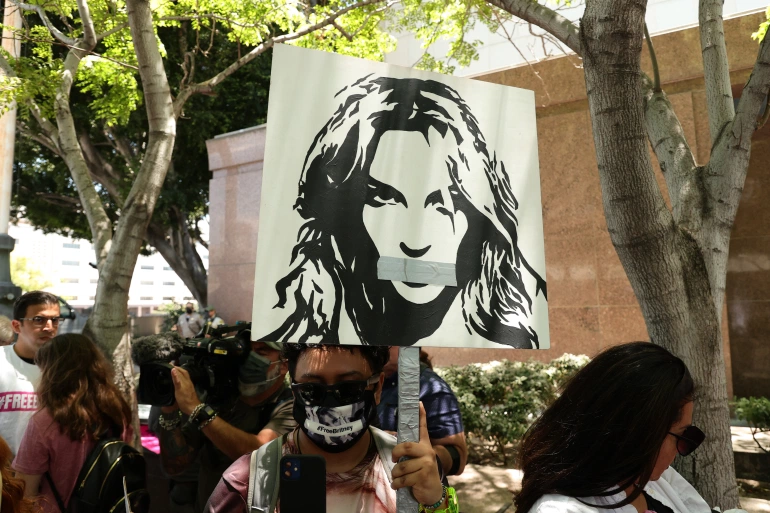
IUDs are invasive and risky. Britney Spears’ conservatorship highlights how women are expected to bear those risks.
Last month, the world listened as Britney Spears, the American singer and pop star, described in detail to a court her experience of being subjected to a conservatorship controlled by her father, James Parnell Spears. When Spears had a very public breakdown in 2007 it seemed appropriate her father take control to safeguard her estate. Over a decade later, however, her testimony raised hairs on my arms as I listened to her blow-by-blow account of an arrangement she calls “abusive”.
In a chilling scene reminiscent of something from Margaret Atwood’s The Handmaid’s Tale, Spears revealed that she has been refused permission to remove an intra-uterine contraceptive device (IUD) which stops her getting pregnant. It is unclear whether Spears consented to have the IUD inserted, or how long she has had it, but one thing is clear. Under this conservatorship she apparently has no say on whether it remains.
Her revelation triggered memories of my own experience with an IUD and reminded me of how angry I am that women are just expected to embrace these invasive devices – in many cases inserted without any sort of pain relief (as Caitlin Moran so elegantly explained in her Times column). I would like to know where the IUD-male-equivalent is? It seems that, just like Britney’s father, patriarchy prefers us sterile at the expense of our health, at their pleasure – essentially, controlling our bodies.
The West is quick to judge the enforcing of sterilisation and contraception on women in other cultures – such as that of the Uighurs by the Chinese government – but in the US, the so-called “land of the free”, a woman of Spears’ stature and fame is being denied agency over her own body.
When an IUD was suggested to me many years ago as a remedy for my stomach problems and painful periods, the doctors said it was generally safe, but that it carried a small chance of complications, such as pelvic inflammatory disease (PID). The emphasis was on its safety, not on its risk. I was handed a glossy pamphlet with a picture of a couple embracing on the cover. It was an alluring image, which seemed to be offering the solution to my womanly problems – freedom from my periods and the freedom to have sex without the worry of pregnancy. I was young, naïve and impressionable. I just assumed PID was easily treatable should it occur.
For three years, the IUD ticked like a time bomb inside my uterus until I ended up in hospital, unable to walk properly, talk much or be touched because of the pain – it was as if my entire body had been shut down. I did not know it at the time, but I had developed PID. Five years on, I still have PID – inflammation in my uterus that still has not healed.
The stats show that more than 10 percent of women experience infection from IUDs and that up to 5 percent contract PID. But the problem with IUDs is that sometimes there is no way of knowing if they are doing damage until it is too late. My symptom was bleeding but that is a normal side effect of IUDs. My GP was not concerned when I presented to her. She prescribed hormones to settle it. I was sexually active so I had her do some swabs. She said I had some mild bacteria that would clear on its own. I asked if I needed to see a gynaecologist. She said it was not necessary.
A vagina is self-cleaning. It is a delicate ecosystem that balances out bacteria to protect itself from sexually transmitted infections. Some bacteria that gets passed through sex is more harmful than others. Some clears up on its own. Bacterial vaginosis (BV) is an overgrowth of vaginal bacteria. IUDs can double the risk of BV because an IUD is a foreign object that alters the natural balance of the vagina. Without treatment, BV can lead to PID. Several studies have reported an increased risk of PID in IUD users – a three to ninefold increase compared with non-IUD users – but it is more prevalent in young women with many sexual partners.
When I got sick I felt ashamed, as if I had caused my illness. After years of reflection I do not think I should have felt this guilt. This is the system that patriarchy has set up for women, to punish us for our bodies, to make us feel ashamed for our pleasure, washing its hands of any accountability. Despite the risks, IUDs are being handed out to young girls as a solution to unplanned teenage parenthood. Many of these young girls risk permanent infertility if they develop PID.
New Zealand’s Prime Minister Jacinda Ardern – heralded as a feminist – is giving away IUDs for free, ignoring the thousands of women who have joined IUD Facebook support groups to share their terrible experiences. I believe the risks of an IUD should have been put on the front of that pamphlet I was handed – in red, bold font in the same way cigarettes have a photo of cancer on the packet.
Women must endure pain and shut up about it. You are considered a stronger woman if you endure a drug-free labour, for example. You are a stronger woman if you do not have health issues, if you have a perfect body and a smile all the time.
When I presented my ailment to my GP, I was dismissed. When I presented it to the hospital emergency department, nobody checked my uterus even when I told them I had an IUD.
Instead, they checked me into a pain management hospital for fibromyalgia. They had me doing therapy in a chlorinated pool while the infection pumped through my body, damaging my lymph nodes. It was only when I started bleeding more heavily that they called a gynaecologist. He took one look and asked me to cough while he pulled the IUD out.
I was prescribed antibiotics to clear the infection. But even after that, when my body started changing shape and expanding in unexplainable ways, I was again ignored and told by my new GP that it was my age, that it was weight gain. When I travelled overseas and my body blew up like a balloon after flying, the GP there just said it was fluid retained during the flight and that it would settle. I continued to travel without compression stockings, which I now know was a danger to my health, because when I returned home my GP referred me to a vascular surgeon who diagnosed lymphedema – damage to my lymph nodes caused by the infection from the IUD. My lymphatic fluid was not draining properly.
I now have to wear compression stockings daily and need manual lymphatic drainage. My periods are even more painful than before. While I may have learned to manage my conditions, and I am a “stronger woman” for all that I have endured, a part of me remains bitter and angry that I was not told more clearly about the risks of IUDs. To think that any woman is being forced to have an IUD, like Spears, is horrifying. It is a clear infringement on human rights.
In 2018, I interviewed Dr Lesley Hoggart, associate head at the School of Health, Wellbeing and Social Care at the Open University in the UK. She told me that she believes more research needs to be done into the IUD. Has my experience been captured in the research? Have the experiences of the thousands of women in Facebook groups been captured? Or are we still being ignored – swept away – just like Spears’ voice is in danger of being by the courts?

By Koraly Dimitriadis is a Cypriot-Australian writer, poet and actor – aljazeera




 World Opinions Débats De Société, Questions, Opinions et Tribunes.. La Voix Des Sans-Voix | Alternative Média
World Opinions Débats De Société, Questions, Opinions et Tribunes.. La Voix Des Sans-Voix | Alternative Média




